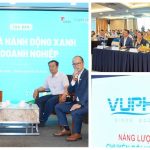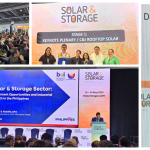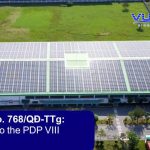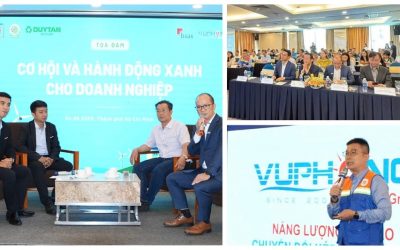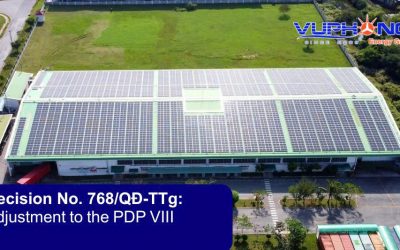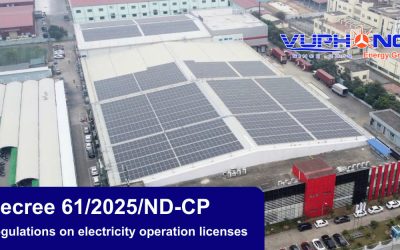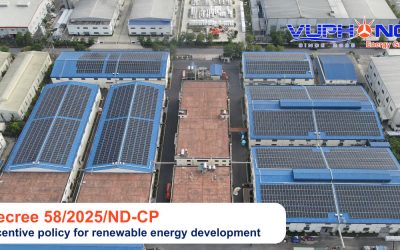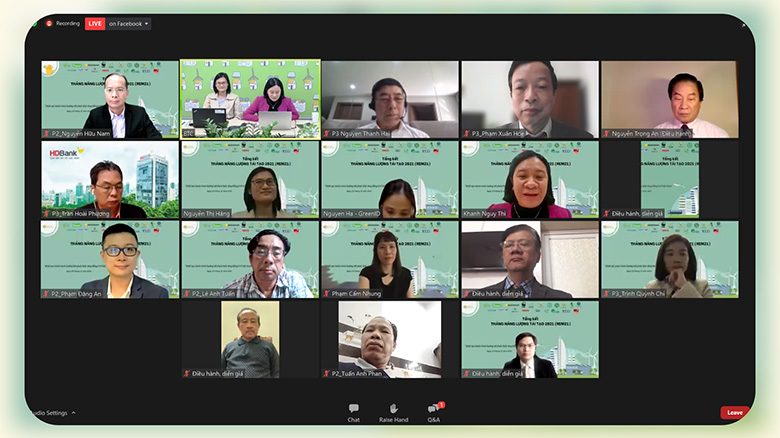
Clean energy, renewable energy, is fast developing by the worldwide trend of energy restructuring and is becoming increasingly concerned following the Prime Minister’s strong commitment to Net Zero emissions by 2050 at COP26. Reducing emissions and working towards Net Zero will become the mainstream, opening up numerous opportunities for Vietnam but also presenting a difficult journey that will need a breakthrough in policy, thinking, and technology…
On the morning of December 23, 2021, more than 100 delegates from central and local state agencies, universities, research institutes, science and technology organizations, financial institutions, associations, centers, enterprises… attended the Summary Webinar of Renewable Energy Month 2021 (REM21). In the event, participants shared, discussed, and contributed ideas in the spirit of “Starting a journey towards Net Zero emissions in Vietnam.” Net Zero’s goal, opportunities, challenges, and proposed solutions and recommendations were actively discussed from different viewpoints, with the desire to contribute to completing Power Master Plan VIII and political policies on the path towards carbon neutrality.
Emissions reduction will be the mainstream trend
Mr. Tan, Pham Van, Deputy Director General for Climate Change, Ministry of Natural Resources and Environment shared, Vietnam’s commitment to reduce emissions at COP26, saying that many commitments were made at COP26, such as the Net Zero commitments, the transition from coal to clean energy, the commitment to reduce methane emissions, the commitment to forests and land use, accelerating the transition to 100% zero-emission vehicles… Vietnam has joined the commitments on reducing methane emissions, protecting forests and land, transitioning from coal to sustainable energy, and achieving Net Zero emissions by 2050.
According to the Deputy Director General for Climate Change, after making the above firm promises, Vietnam began a meeting on executing Vietnam’s obligations and subsequently created a National Steering Committee implementing Vietnam’s commitments at COP26(as per Decision No. 2157/QD-TTg of December 21, 2021). The Steering Committee is an inter-sectoral coordination group that assists the Prime Minister in researching, directing, and coordinating the resolution of critical and work relating to Vietnam’s commitments at COP26.
Mr. Tan stated that low-emissions development would be the mainstream for Vietnam to continue to comprehensively change the development model from fossil energy-based, resource-intensive to a development model based on low-emissions. “Vietnam, along with industrialized nations with great economic and technical potential, follows the global development path. The reduction commitment toward Net Zero emissions and the methane commitment has sent a powerful signal to the international community, opening up global financial resources for low-emission development; this is an opportunity for Vietnam’s development.”
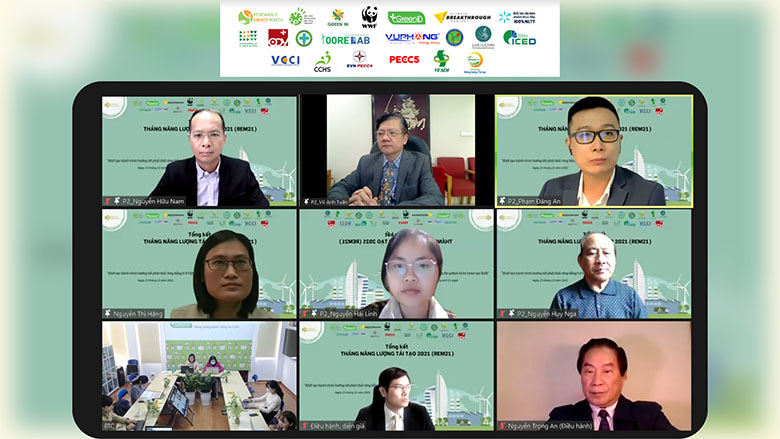 Some speakers shared at the seminar
Some speakers shared at the seminar
Great financial opportunity
In agreement with Mr. Tan, Pham Van, Dr. Hai, Nguyen Thanh, Senior Economist, German Agency for International Cooperation (GIZ), stated that Vietnam is about to get the chance to access and mobilize a large green financial source, the Glasgow Financial Union, for Net Zero emissions (GFANZ). The coalition, which includes more than 450 institutions and banks – represents 130,000 billion USD, or 40% of the world’s financial assets, will generate massive financial demand for the issuance and mobilization of capital using tools such as green bonds, green credits, and so on. The supply of green finance for emerging markets like Vietnam, in particular, will increase dramatically. Another benefit is that the majority of multinational firms and large financial institutions with a commercial presence in Vietnam are members of GFANZ.
Dr. Hai, Nguyen Thanh further stated that in the past, renewable energy funding from the financial and banking systems accounted for around 60% of overall renewable energy investment. This is a “huge” revenue source that few people consider while adopting Power Plan VII or Power Plan VII (adjusted). Thus, if sensible policies are implemented, it is conceivable to mobilize huge amounts of domestic financial resources from the financial and private sectors.
According to Mr. Phuong, Tran Hoai, Head, Commercial Banking at HDBank, HDBank is one of the banks that provide green credit and presently has a total outstanding amount of more than $500 million USD in green financing categories. HDBank has signed agreements with many international financial institutions and organizations, including DEG (Development Finance Institution under the KFW Reconstruction Bank of Germany), Proparco (French Development Finance Organization), and others, to provide green credit resources to businesses in Vietnam, and will continue disbursement soon.
Need a breakthrough
The speakers at the seminar all agreed that, although Vietnam’s commitment is strong, in line with the global development trend, and has many favorable opportunities, the journey to Net Zero is also fraught with many challenges, knowledge, policy, thinking, technology, and so on need a breakthrough.
Ms. Hanh, Dang Hong, Co-founder and CEO of Energy and Environment Consulting Joint Stock Company (VNEEC), provided an analysis based on socioeconomic development forecasts from international organizations and existing practicable emission reduction technology in each sector and sub-sector, there are still 238 million tonnes of emission reductions to reach the Net Zero goal even with ambitious scenarios in the five greenhouse gas emission sectors. As a result, in the future, a breakthrough in large-scale power generating and energy storage technologies will be required to ensure that renewable energy accounts for 90% of total system electricity production. Furthermore, new industrial-scale energy sources (such as green hydrogen from renewable energy utilized as an alternative to transportation) and large-scale feasible carbon capture and storage technology are required.
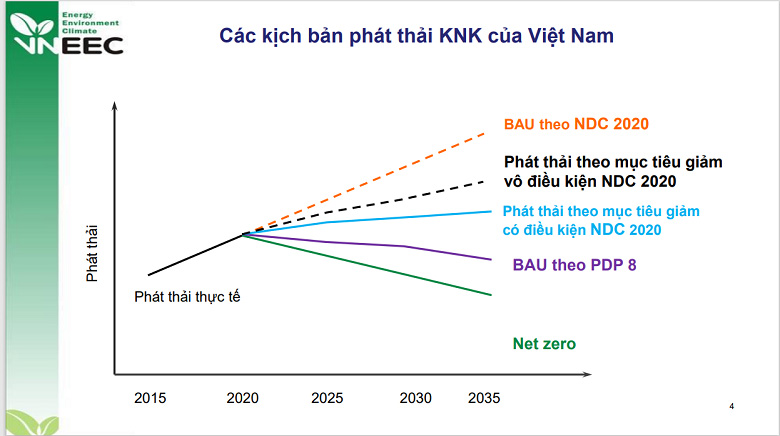 Analysis of Vietnam’s greenhouse gas emission scenarios (according to VNEEC)
Analysis of Vietnam’s greenhouse gas emission scenarios (according to VNEEC)
Delegates at the event also gave recommendations on energy storage, electric cars, hydrogen, and so on. About energy storage, it is necessary to implement more pilot projects in areas with abundant renewable energy resources, consider including in Planning VIII the scale of ESS investment in line with the power grid and source development scenarios, and sync with the renewable energy development mechanisms… Regarding electric cars, policies and roadmaps are also required to develop electric vehicles, such as infrastructure planning (charging stations, infrastructure for integrating electric vehicles into the grid); technical studies such as electric vehicle technology, its effect on the power grid; policies for consumers, manufacturers, distributors, research and training parties, electric vehicle development planning, etc. Technological breakthroughs and policy assistance, particularly pilot technologies, are also required to develop hydrogen. Furthermore, it is essential to raise awareness and interest in this topic among young people…
All delegates agreed that they should be transparent, clear, long-term, and stable. Mr. Nam, Nguyen Huu, Deputy Director of VCCI Ho Chi Minh City, stated that when making policies, it is necessary to consult with stakeholders to balance the interests of enterprises and the state; there is no discrimination between economic sectors, and it is necessary to create conditions for all parties…
The delegates also made numerous specific recommendations at the workshop on other legal and policy frameworks, such as developing a green energy law, amending the Electricity Law, speeding up the roadmap for developing a competitive electricity market, establishing a mechanism to encourage renewable energy, and encouraging the private sector, including the banking and financial sectors, to develop green energy… The Organizing Committee will consolidate all viewpoints expressed by delegates at the Summary Workshop and seminars held throughout Renewable Energy Month 2021 (REM21) to submit to agencies and sectors, therefore contributing to Vietnam’s journey toward Net Zero emissions.
|
Renewable Energy Month 2021 (REM21) is an expanded version of Renewable Energy Week, a yearly event started in 2016 by the Vietnam Sustainable Energy Alliance (VSEA). On February 2nd, REM21 successfully organized 13 events in December 2021, with subjects centered on renewable energy and sustainable energy development, such as Green city strategies to minimize greenhouse gas emissions; Solutions and uses for energy storage for projects in Vietnam; Global trends in electric vehicle development and its consequences for Vietnam; Clean hydrogen: Trends in technology and investment potential, applications in Vietnam… All topics and discussions aim to contribute to Vietnam’s journey to Net Zero emissions. Vu Phong Energy Group is one of the entities accompanying REM21 and participating in the December 23 Summary Seminar. Previously, Vu Phong Energy Group took part in the program’s webinar on Energy Storage Solutions (December 13). |
Vũ Phong Energy Group
